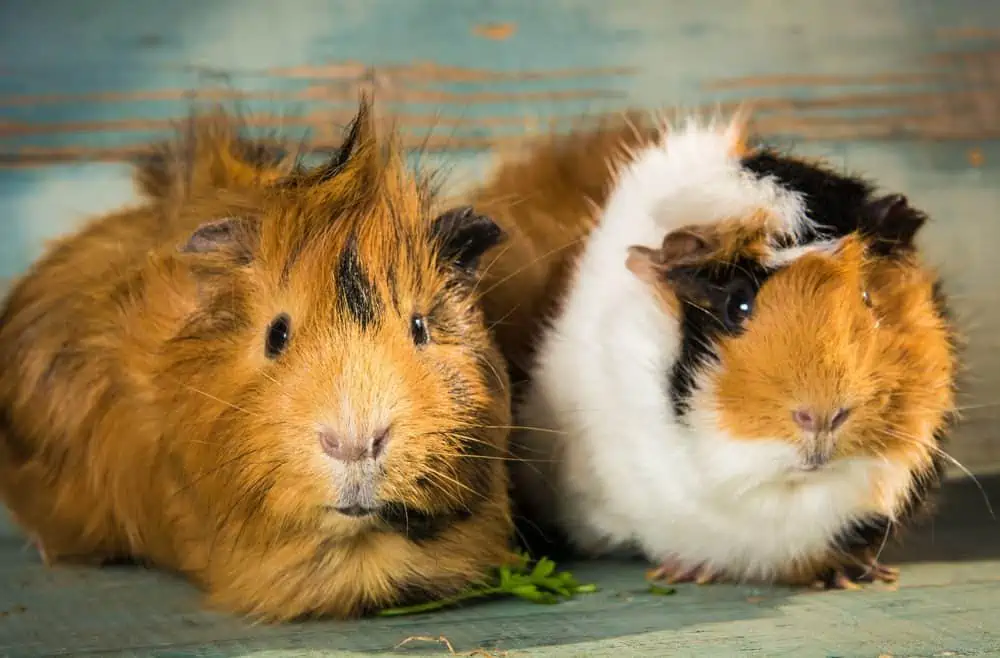Guinea pigs are social creatures that communicate through a variety of sounds and body language. They are herbivores that require a diet high in vitamin C to stay healthy.
Guinea pigs, also known as cavies, are fascinating small pets that have captured the hearts of many animal lovers around the world. These adorable rodents are not only great companions but also have some unique characteristics that set them apart from other small animals.
From their various vocalizations to their playful nature, there are many amazing facts about guinea pigs that showcase their individuality and charm. Let’s dive into the world of these delightful creatures and explore what makes them so special.

Credit: www.burgesspetcare.com
Contents
The Origin And History Of Guinea Pigs
Guinea pigs, also known as cavies, are adorable and sociable creatures that have a rich history dating back thousands of years. The origin and history of guinea pigs are intriguing, with their domestication and roles in indigenous cultures offering a fascinating glimpse into their past.
Early Domestication
The domestication of guinea pigs can be traced back to the Andean region of South America, specifically in present-day Peru, Bolivia, and Ecuador. Dating back to around 5000 BC, guinea pigs were initially domesticated for their meat and used in religious ceremonies. Their docile nature and ease of breeding contributed to their popularity among ancient civilizations, leading to their widespread presence in households.
Roles In Indigenous Cultures
Guinea pigs held significant cultural and spiritual importance in Andean societies. They were often utilized in traditional medicine and were even used as offerings in religious rituals. Their significance extended beyond sustenance, as they were revered for their symbolic and therapeutic roles within indigenous communities. The bond between guinea pigs and humans transcended mere companionship, reflecting the deep-rooted connection between the two.
:max_bytes(150000):strip_icc()/GettyImages-638710017-5cc903c317d047b9b1f8557fb14fef58.jpg)
Credit: www.treehugger.com
Physical Characteristics And Breeds
Guinea pigs are fascinating little creatures, each with its own unique physical characteristics and breeds. From the texture and color of their fur to the distinct features that define different breeds, there’s a wealth of interesting information to explore.
Fur Types And Colors
Guinea pigs boast a variety of fur types and colors, making them visually captivating pets. The most common fur types include smooth, coarse, and curly, each with its own distinctive appearance and texture. Additionally, guinea pigs come in an array of colors, ranging from solid black, white, and brown to multi-colored patterns that add to their charm.
Recognizing Different Breeds
Recognizing different guinea pig breeds can be an exciting endeavor. Each breed is characterized by unique physical traits, such as body shape, ear size, and coat length. The American, Abyssinian, and Peruvian are just a few examples of popular guinea pig breeds, each with its own distinctive features that make them stand out from the rest.
Unique Behaviors And Sounds
Guinea pigs are fascinating creatures with a wide range of unique behaviors and sounds that help them communicate and interact with their environment and fellow companions. Understanding these behaviors and sounds can provide valuable insights into the world of these adorable pets.
Understanding Their Vocalizations
Guinea pigs are quite vocal creatures, using an array of sounds to express their emotions and needs. From chirping and whistling to chattering and purring, each sound carries a specific meaning. Chirping often signifies excitement, while whistling can indicate happiness. On the other hand, chattering may convey annoyance or agitation, and purring is a sign of contentment.
Social Interactions Among Guinea Pigs
Guinea pigs are highly social animals and thrive in the company of their own kind. They engage in various social behaviors, such as nose nudging, grooming, and popcorning. Nose nudging is a form of friendly interaction, while grooming helps them establish and maintain social bonds. Popcorning is an exuberant display of joy, where guinea pigs leap into the air, expressing their happiness and contentment.
Dietary Needs And Preferences
Discover amazing facts about Guinea Pigs’ dietary needs and preferences, showcasing their love for hay, vegetables, and Vitamin C-rich foods. Guinea Pigs are herbivores with sensitive digestive systems, requiring a balanced diet for optimal health and well-being.
Dietary Needs and Preferences: Guinea pigs are herbivores and require a specific diet to maintain good health. A balanced diet for guinea pigs consists of hay, fresh vegetables, and fruits. Here are some amazing facts about the dietary needs and preferences of guinea pigs.Essential Nutrients: Guinea pigs require a variety of essential nutrients to keep their bodies healthy. Some of the nutrients that are vital for guinea pigs include vitamin C, calcium, and fiber. Vitamin C is particularly important for guinea pigs as their bodies cannot produce it on their own.Favorite Foods and Treats: Guinea pigs have some favorite foods that they love to eat. Hay is a staple food for guinea pigs, and they can eat it in unlimited amounts. Fresh vegetables like carrots, broccoli, and bell peppers are also great for guinea pigs. Some of the favorite treats for guinea pigs include apples, bananas, and strawberries.To ensure that your guinea pig gets all the essential nutrients it needs, it is essential to provide a balanced diet. You can also provide supplements to your guinea pig, especially vitamin C, to keep them healthy. It is also important to remember that guinea pigs have sensitive digestive systems, so it is crucial to introduce new foods slowly and in small quantities.In conclusion, providing a balanced and healthy diet is critical to ensure that your guinea pig stays healthy and happy. By including essential nutrients and their favorite foods in their diet, you can keep your furry friend healthy and satisfied.Habitat And Living Conditions
Guinea pigs are delightful pets known for their friendly nature and adorable appearance. Understanding their Habitat and Living Conditions is crucial for their well-being.
Creating A Comfortable Environment
Ensure your guinea pig’s enclosure is spacious and equipped with bedding for comfort.
The Importance Of Space And Companionship
- Guinea pigs thrive in a habitat with ample space to roam and explore.
- They are social animals and benefit from the companionship of other guinea pigs.
Health And Lifespan
Discover amazing facts about guinea pigs that can positively impact your health and lifespan. These adorable pets offer companionship, reduce stress, and promote a healthier lifestyle through their playful nature and unique characteristics.
Guinea pigs are adorable creatures that require proper care to ensure a healthy and long life. Let’s explore some important aspects related to their health and lifespan.Common Health Issues
Guinea pigs are susceptible to several common health issues that owners should be aware of:– Respiratory infections due to drafts or poor ventilation. – Scurvy caused by a lack of Vitamin C in their diet. – Parasites such as mites or lice. – Dental problems like overgrown teeth.Maximizing Their Lifespan Through Care
To maximize the lifespan of your guinea pig, consider the following care tips:1. Provide a balanced diet rich in hay, fresh vegetables, and Vitamin C. 2. Regular veterinary check-ups to monitor their health. 3. Clean living environment to prevent infections. 4. Plenty of exercise to keep them active and healthy.Guinea Pigs In Research And Science
Guinea pigs are commonly used in scientific research due to their genetic similarity to humans. They have contributed to important medical breakthroughs in fields such as genetics, immunology, and neuroscience. Did you know that guinea pigs can develop scurvy if they don’t get enough Vitamin C in their diet?
Guinea pigs are not only popular as pets but have also been valuable in scientific research. These small animals have made significant contributions to medical discoveries, which have helped to improve human health. In this section, we will explore some amazing facts about Guinea pigs in research and science, including their role in medical discoveries and ethical considerations.Their Role In Medical Discoveries
Guinea pigs have played a vital role in medical discoveries for many years. These animals have been used in various experiments to develop vaccines and treatments for human diseases. For instance, scientists used Guinea pigs to develop the whooping cough vaccine, which has saved countless lives. Additionally, Guinea pigs have been essential in studying the effects of drugs on different organs and systems in the body.Ethical Considerations
While Guinea pigs have been valuable in medical research, ethical considerations must be taken into account. Researchers must ensure that Guinea pigs are treated humanely and not subjected to unnecessary pain and suffering. The use of animals in scientific research must follow strict guidelines and regulations to ensure that they are not mistreated or abused. It is vital to strike a balance between scientific progress and animal welfare to ensure that research is conducted ethically and responsibly.In conclusion, Guinea pigs have made significant contributions to scientific research and have helped to improve human health. While their use in research is essential, ethical considerations must be taken into account to ensure that they are treated humanely. Guinea pigs are more than just pets; they are valuable assets in the scientific community.
Credit: www.teacupnethies.com.au
Fun Facts And Trivia
Discover amazing facts about guinea pigs! Did you know that these furry creatures have unique vocalizations to communicate? Guinea pigs also have a strong sense of smell and can recognize their owners.
Guinea pigs are adorable, friendly, and intelligent pets that are loved by many people. They are also fascinating creatures with a long history of domestication and unique characteristics. In this section, we will explore some fun facts and trivia about guinea pigs that will surprise and delight you.Surprising Guinness World Records
Did you know that guinea pigs hold several Guinness World Records? These cute little rodents have amazed the world with their remarkable abilities and achievements. Here are some of the most surprising records:| Record | Guinea Pig | Details |
|---|---|---|
| Longest jump | Rufus | Rufus jumped 1 meter and 17 centimeters in length. |
| Longest hair | Merlin | Merlin’s hair measured 36.5 centimeters long. |
| Largest collection | Carlton | Carlton’s owner had a collection of 1,000 guinea pig-related items. |
Celebrity Guinea Pig Owners
Guinea pigs are not only beloved by regular people, but also by some famous celebrities. Here are some of the most surprising celebrity guinea pig owners:- Prince William and Kate Middleton
- Nicolas Cage
- Paris Hilton
- Elvis Presley
- Hayden Panettiere
Frequently Asked Questions
Q: How Long Do Guinea Pigs Live?
A: Guinea pigs have an average lifespan of 5 to 7 years, but with proper care, they can live up to 8 years or even longer.
Q: What Do Guinea Pigs Eat?
A: Guinea pigs primarily eat hay, fresh vegetables, and pellets specifically formulated for their nutritional needs. It’s important to provide a balanced diet to ensure their health and well-being.
Q: Can Guinea Pigs Be Kept Alone?
A: While guinea pigs are social animals, they can be kept alone if provided with plenty of human interaction and mental stimulation. However, it’s recommended to have at least two guinea pigs to prevent loneliness and promote companionship.
Q: How Often Should Guinea Pigs Be Bathed?
A: Guinea pigs generally do not require frequent baths as they are clean animals. However, if necessary, they can be bathed once every 1-2 months using a mild shampoo specifically designed for small animals.
Conclusion
These amazing facts about guinea pigs showcase their fascinating nature and unique characteristics. From their social behavior and communication skills to their adorable squeaks and their ability to learn tricks, guinea pigs make wonderful companions. Whether you’re a long-time guinea pig owner or considering getting one, these furry creatures are sure to bring joy and entertainment to your life.
So, embrace the wonder of guinea pigs and enjoy the delightful experiences they have to offer.



